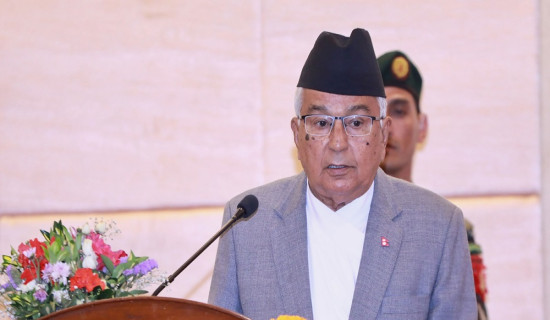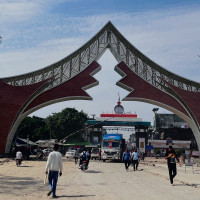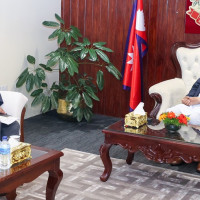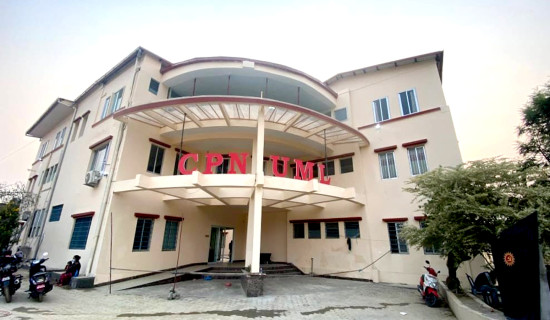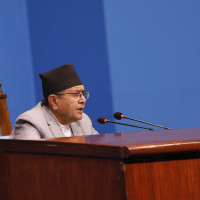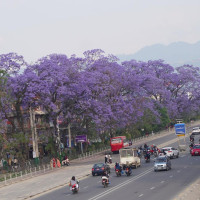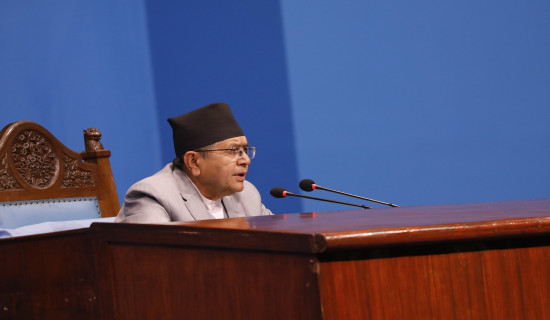- Saturday, 10 May 2025
Cost Of Complacency And Chaos
The violent pro-monarchy protest that turned the Tinkune area of Kathmandu into a chaotic battleground on March 28 has raised a serious and perplexing question. Was it an attempt by the regressive forces to stage a comeback or simply an outburst of public dissatisfaction over the poor performance of the elected government? From an ideological point of view, the violent protest appears to have been driven by a regressive mindset, however, the size and the passion of the protesting masses suggest a deeper issue- something is going seriously wrong in the implementation of federal republican democracy in the country.
In 2008, Nepal's parliament overthrew the monarchy, paving the way for the federal democratic republican system in 2008 hoping that it would bring stability and prosperity in the country. When the constitution was promulgated in 2015, the monarchy was relegated to irrelevance with virtually no role for it under the constitutional framework. During the ensuing years, supporters of the monarchy continued to claim that this institution was rooted in Nepal's cultural identity and was nurtured by Hindu religious tradition. In contrast, the multiparty camp emphasised secularism and the protection of minority identities.
Leftist and liberal democratic parties diligently tried to shape up pro-federal and republican narrative. Meanwhile, the pro-monarchy forces quietly organised themselves in various forms and continued to engage with the religious constituency aligned with Hinduism. In Nepal, the monarchy has been claiming strategic high ground, presenting itself as a symbol of patriotism and a pillar of national stability. The persistent political instability marked by a change of government - thirteen times within a short span of 17 years - deepened the skepticism towards the competence of elected governments, contributing to the growing receptiveness of the monarchy.
Monarchy is inherently unrepresentative and fundamentally incompatible with the principles of democratic governance. From a Marxist point of view, it is a superstructure of the feudal system representing the political, legal and ideological institutions that serve the underlying economic base of feudalism. As a symbol of centralised royal authority, it is a tool of power which is exercised upon the masses of the people through aristocratic landowning classes and religious power centers. It also claims its legitimacy from divine rights, which clash with the principles and practices of the representative system of governance.
Regardless of its constitutional status, however, the former king continues to enjoy significant support in the Nepali society. Several factors contribute to this sentiment. Prithvi Narayan Shah, the founder of modern Nepal, is credited with having unified about 50 principalities into a unified Kingdom. This unification enabled Nepal to resist the imperial expansion of both British India and China. Many Nepali people believe that Prithvi Narayan Shan and his descendants have made a vital contribution to preserving Nepal's sovereignty and independence through delicate diplomatic engagements.
Another factor responsible for the monarchy's popularity in Nepal is the belief that Nepali kings are the incarnation of Lord Vishnu. This belief reinforces the divine rights of Hindu kings to rule not only in Nepal but also to act as the spiritual leaders of Hindu populations worldwide. This theory provides legitimacy for a king to derive their right to rule directly from God and not from the consent of the people.
Setting aside these fortuitous advantages, Nepal's monarchy may have to wield absolute authority, but the most significant factor for its enduring popularity is the failure of democratic institutions to deliver good governance. Democracy is often described as the rule of the people, by the people and for the people. But when elected authorities fail to ensure basic services like education, health and employment, people's faith in democracy starts to wane. Democracy is expected to curb corruption, enhance efficiency, and provide stability and security to the people. Its inability to fulfill these promises leads to rapid erosion of public trust, leaving citizens frustrated and disillusioned.
Democratic governments that are installed through election are the strongest institutions but they remain strong only so long as they derive their legitimacy from popular consent and are able to deliver public welfare. Democracy loses its lustre when individual leaders wield power without broad popular support. It is a system of checks and balances which, if used properly, can prevent the concentration of power around powerful individuals. They exploit democratic institutions such as the legislature, judiciary and the media, bending them to serve their interest through undue influence, corruption and false rhetoric. Under the guise of popular mandate, they undermine opposition, weaken accountability and centralise power. Through manipulation of electoral processes, powerful leaders concentrate power and wealth around them, creating an illusion of public participation.
System of succession
Noam Chomsky aptly puts it when he says, "Democracy is largely a sham when the public has little control over policies and when wealth dictates democratic principles". This is exactly what is happening in the young democracies of developing countries - Nepal being no exception. Nepali democratic leaders, who led the 1990 people's movement, continue to cling to power, taking turns and enriching themselves through ill-gotten wealth, while ordinary citizens grow increasingly powerless and impoverished. Political parties have failed to develop a system of succession or to bring in fresh leadership by promoting the young generation, nor have they institutionalised the system of retirement of leaders after completing a certain terms in office.
Taking advantage of this policy vacuum, the monarchists, who were once overthrown to pave the way for a representative system, are claiming superiority and may be plotting their return, as all regressive forces often do, when they find democratic institutions in a state of chaotic disarray. In his seminal work, State and Revolution, V.I. Lenin writes, 'no ruling class ever gives up power without a struggle, without exerting desperate resistance'. The violent outburst of 28 March may be such a last-ditch effort from the monarchists to reassert their fading relevance. The lesson from the incident for the democratic forces is that anything lost to complacency and chaos cannot be reclaimed. It is time for them to get their acts together and correct their course before history begins to repeat itself.
(Dr. Bharadwaj is a former ambassador and former chairperson of Gorkhapatra Corporation. bharadwajnarad@gmail.com.)



